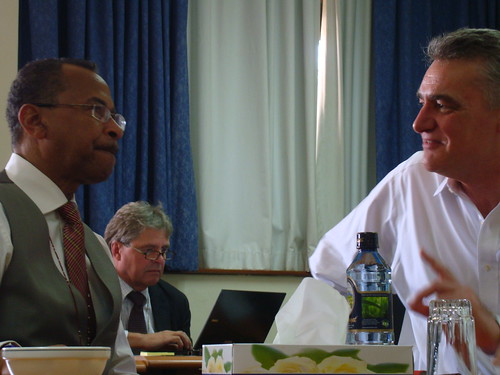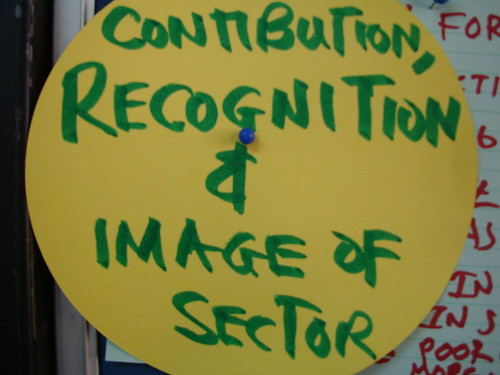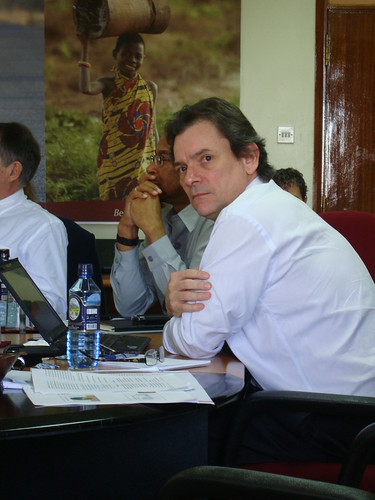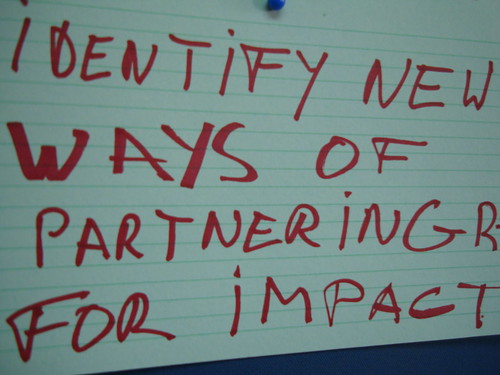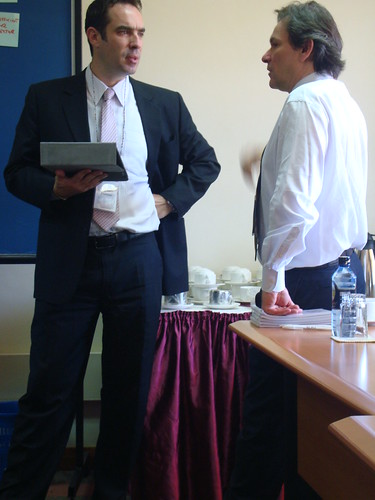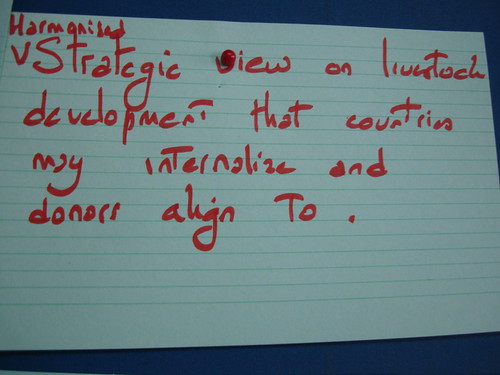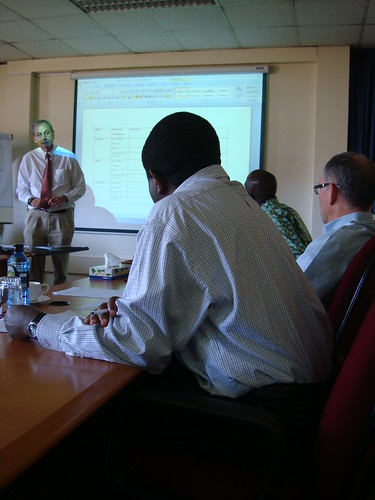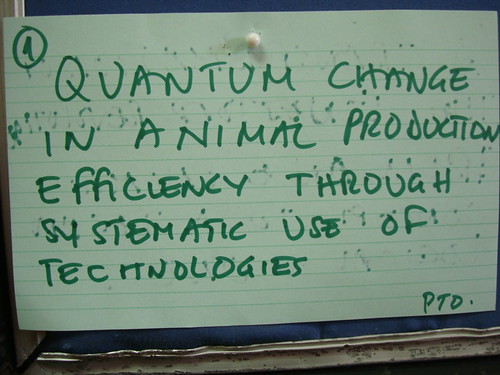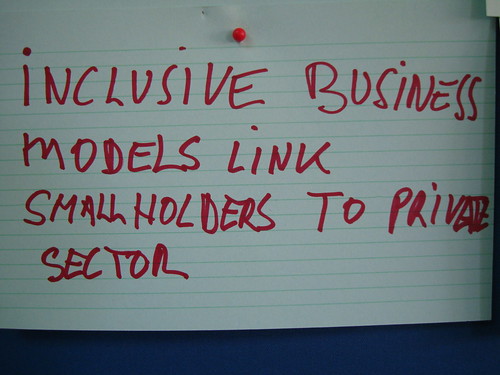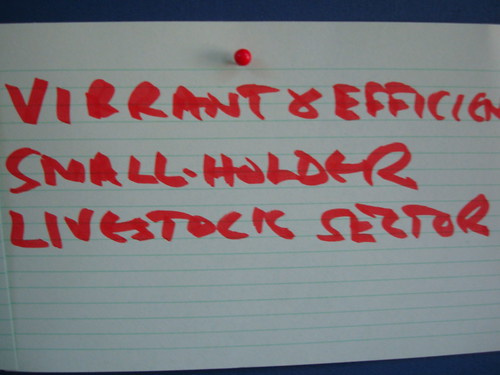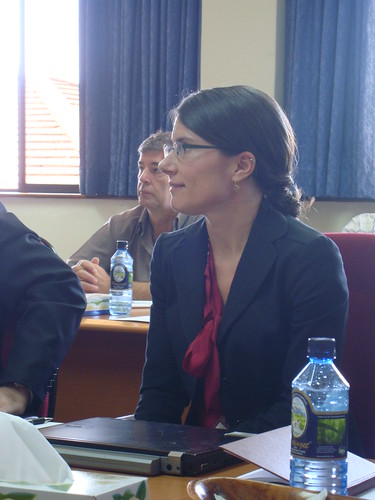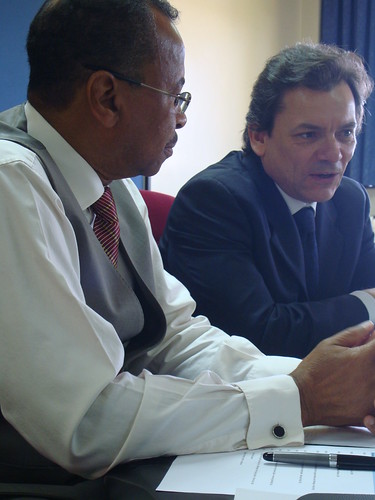Watch this 3.3-minute video interview of Henning Steinfeld, who leads the livestock sector analysis and policy branch at the Food and Agriculture Organization of the UN. He spoke at the sidelines of the Third Multi-Stakeholder Platform Meeting of the Global Agenda of Action in Support of Sustainable Livestock Sector Development, which was co-hosted in Nairobi, Kenya, by ILRI, FAO and AU-IBAR, 22–24 Jan 2013 (video produced by Muthoni Njiru, of ILRI’s public awareness unit).
Shirley Tarawali, director of institutional planning and partnerships at the International Livestock Research Institute (ILRI), is attending the 4th multi-stakeholder platform meeting of the Global Agenda of Action in Support of Sustainable Livestock Sector Development (GAA) this week, 15–17 Oct, in Ottawa, Canada. The meeting aims to address the complexity of the challenges facing the sector which can be addressed only through concerted joint action.
This Agenda builds consensus among livestock sector actors on the path towards sustainability. Like its other members, ILRI believes the livestock sector is crucial to society achieving its environmental, social, economic and health objectives.
Basically, the livestock sector needs to produce more, from less, and with benefits to all.
A tall order. Can it be done? The Global Agenda of Action thinks it can.
‘The purpose of the Agenda is to catalyze the continuous improvement of the sector’s natural resource use to ensure the sector’s contribution to sustainability in food and agriculture. The partnership unites the forces of the public and private sectors, producers, research and academic institutions, NGOs and social movements and community-based organizations.’
Set up of the current Agenda
- Open multi-stakeholder platform for consensus building on top-priority issues and actions
- Guiding group for overall direction, guidance and monitoring
- Focus area groups to implement the work programs
- Support group
The GAA aims to help improve the efficiency of natural resource use in the livestock sector through work in the following three areas.
Focus area 1: Closing the efficiency gap
Generating large resource use efficiency, economic, and social gains through the use of livestock-related technologies, management practices, policies and institutional frameworks through, for example, quantification of efficiency gaps in target countries, regions and production systems
Focus area 2: Restoring value to grasslands
Enhancing livestock-related ecosystem services, productivity and livelihoods through the restoration, optimal management and utilization of grasslands through, for example, synthesis of non-market benefits of grassland restoration and an assessment of global grassland carbon sequestration potential
Focus area 3: Transforming waste to worth
Reducing nutrient overload and greenhouse gas emissions by livestock systems through the recovery and recycling of nutrients and energy contained in manure through, for example, a global inventory of current manure distribution, management practices and associated nutrient balances
This morning (15 Oct 2013), ILRI director Shirley Tarawali, an agronomist and livestock feed specialist by training, took part in a panel discussion questioning whether the Agenda should address ‘comprehensive sustainability’.
What is the evidence that it can be done? ILRI scientists are working to help obtain this (see below, for example). What strikes Tarawali most is the cogency of the three focus areas chosen to build this sustainability and the consistency of alignment demonstrated among the diverse kinds of livestock stakeholders taking part in this Global Agenda of Action.
Asked if we need an ‘IPCC’ to help us manage a sustainable evolution of the global livestock sector, Tarawali answered: ‘The Global Agenda is the IPCC of our global livestock systems! If we pay serious attention to the Agenda’s three focus areas of work, we can do this.’
ILRI scientists working directly with the Global Agenda of Action
ILRI director and agronomist/feed specialist Shirley Tarawali (UK) is part of the Guiding Group. Feed resources specialist Michael Blümmel (Germany), agricultural economist Hikuepi (Epi) Katjiuongua (Namibia) and sustainable livestock systems project leader Iain Wright (UK) are working with the Agenda’s Efficiency Group. Ecosystem ecologist Rich Conant (USA), livestock and the environment leader Polly Ericksen (USA) and ILRI Forage Genebank manager Alexandra Jorge (Mozambique) are working with the Agenda’s Grasslands Group. And landscape ecologist Tim Robinson (UK) and environmental scientist Nguyen Viet Hung (Vietnam) are working with the Agenda’s Manure Group.
See the Agenda strategy and consensus.
Directly below, view the slide presentation made by ILRI director general Jimmy Smith at the Third Multi-Stakeholder Platform Meeting of the Global Agenda of Action in Support of Sustainable Livestock Sector Development, which was co-hosted in Nairobi, Kenya, by ILRI, FAO and AU-IBAR, 22–24 Jan 2013.
Or, below, watch this 3-minute video produced by FAO introducing the Global Agenda of Action.

